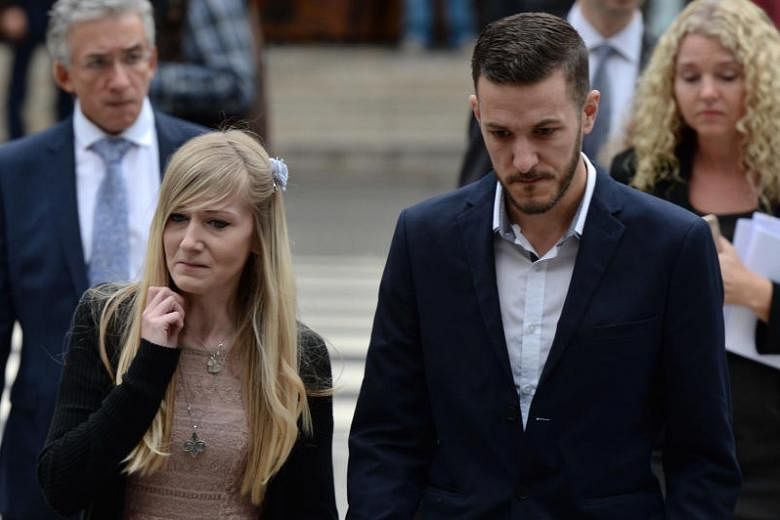LONDON (REUTERS) - The parents of British baby Charlie Gard, whose fate has captured global attention, have ended their legal battle to give the terminally-ill child further treatment and will discuss with his London hospital how he should be allowed to die, a lawyer representing the parents said on Monday (July 24).
Grant Armstrong, speaking in London's High Court, said the parents had dropped their legal fight for Charlie to continue to receive treatment because scans showed that the child suffered irreversible damage.
"For Charlie, it's too late, time has run out. Irreversible muscular damage has been done and the treatment can no longer be a success," he said. "Charlie has waited patiently for treatment. Due to delay, that window of opportunity has been lost."
Charlie's mother, Connie Yates, who won the support of US President Donald Trump and Pope Francis with a campaign to keep him alive, said 11-month-old Charlie could have lived a normal life if he had been given treatment earlier.
"This is the hardest thing we'll ever have to do," she said in London's High Court where a judge had been due to hear final arguments as to why a hospital should not turn off the boy's life support.
"We have decided it is no longer in his best interests to pursue treatment," Yates said. "We have decided to let our son go ... Charlie did have a real chance of getting better. Now we will never know what would have happened if he got treatment."
Charlie has a rare genetic condition causing progressive muscle weakness and brain damage and his parents, Connie Yates and Chris Gard, had been fighting a legal battle to send him to the United States to undergo experimental therapy.
However, Britain's courts, backed by the European Court of Human Rights, have refused permission on the grounds it would prolong his suffering without any realistic prospect it would help the 11-month-old child.
Judge Nicholas Francis was to have decide after a final two-hearing beginning on Monday whether the boy's parents could take Charlie to the US for treatment by Michio Hirano, a professor of neurology at New York's Columbia University Medical Centre.
The case has attracted interventions from US President Donald Trump and Pope Francis, who have both voiced support for Charlie, and led to a fierce debate about medical ethics and whether the hospital treating the child or his parents should determine his fate.
On Saturday, Mary MacLeod, chairman of Great Ormond Street Hospital (GOSH) where Charlie is being treated, said thousands of abusive messages including death threats had been sent to staff while families of other sick children had been harassed.
"We fully understand that there is intense public interest and that emotions run high," Ms MacLeod said. "However, in recent weeks, the GOSH community has been subjected to a shocking and disgraceful tide of hostility and disturbance."
Previous court hearings have witnessed moments of tension and anger between GOSH's lawyers and Charlie's parents, but Yates said they had never condoned any threatening or abusive remarks towards the hospital's staff.
"We are extremely upset by the backlash we have received after Great Ormond Street Hospital put out their statement," she said. "Like them, we have been shocked by some of the public response to this case and agree with them that it is disgraceful that doctors have received death threats."
Monday's hearing will be told the details of a meeting between Dr Hirano, who flew to Britain last week to examine Charlie, and other medical experts involved in the case.
Dr Hirano believes there is at least a 10 per cent chance his nucleoside therapy could improve the condition of Charlie, who cannot breathe without a ventilator, and that there is a "small but significant" chance it would help aid brain functions.

